Delivering exceptional customer service across multiple locations is no small feat, especially since most businesses are competing with large global brands. Long response times, inconsistent messaging, limited support hours, and stretched teams make it tough for multi-location businesses to meet growing customer expectations. That’s where bringing in AI in customer service redefines what great support looks like with instant support, 24/7 availability, and smarter customer interactions.
AI also empowers enterprise businesses to improve the efficiency of traditional customer service teams by automating routine inquiries, analyzing customer data in real-time, and scaling personalized responses across channels.
In this blog, you’ll discover how customer service agents can use AI in real-world use cases, its pros and cons, and how Birdeye’s purpose-built AI helps multi-location businesses deliver consistent, exceptional service at scale.
Table of contents
- How does AI in customer service work?
- How do AI solutions help improve customer service?
- AI in customer services: Pros and cons
- Benefits of using AI in customer service
- Implementing AI in customer service: Examples and use cases
- Ethical use of AI in customer service: 4 must-follow principles
- Conclusion
- FAQs on AI in customer service
- Birdeye solutions: Purpose-built AI solutions for your customer service needs
How does AI in customer service work?
AI in customer service uses technologies like natural language processing (NLP), machine learning, and generative AI to automate and enhance interactions between enterprises and customers.
From automated responses and intelligent chatbots to sentiment analysis and ticket routing, AI-powered customer service tools can handle both simple and complex customer support needs faster and more efficiently than human agents alone.

For multi-location businesses, AI operates as a central intelligence layer across all branches, ensuring consistent communication, unified brand tone, and quick support across every touchpoint, whether it’s chat, email, social media, or phone.
How do AI solutions help improve customer service?
AI solutions have a myriad of applications, and here is how they make it work:
- Natural Language Processing (NLP): Powers chatbots and voice assistants to understand and respond in a conversational tone.
- Machine Learning: Learns from historical interactions and customer behavior to improve over time.
- Sentiment analysis: Detects customer emotions to tailor responses accordingly.
- Predictive capabilities: Helps enterprises anticipate customer needs before they’re expressed.
- AI-powered bots: Handle routine tasks, freeing up human agents to manage complex customer inquiries.
In short, AI transforms customer service operations into a smart, scalable, and always-on system that consistently improves the quality of all customer service interactions.
AI in customer services: Pros and cons
Implementing AI solutions in customer service functions has opened new doors for efficiency, scalability, customer satisfaction, and round-the-clock support. But like any transformative technology, it comes with trade-offs.
Businesses evaluating customer service AI solutions must weigh the rewards against the risks to ensure responsible, effective adoption. Before we discuss the full benefits in the next section, let’s first consider the pros and cons of using AI in customer service.
| Advantages of AI in customer service | Disadvantages of AI in customer service |
| Faster resolutions – AI quickly handles routine inquiries, improving response time and satisfaction. | Customer frustration – When AI misinterprets complex requests, it can slow down resolution and frustrate customers. |
| 24/7 support – Delivers instant support at any hour, helping meet modern customer expectations. | Lack of human connection – Around-the-clock support lacks the emotional nuance of human agents during sensitive moments. |
| Cost savings – Reduces the need for large contact center teams by automating repetitive support. | Overdependence on automation – Too much reliance on AI may erode proactive, human-led customer service strategies. |
| Scalability – Easily handles high volumes of customer queries across all locations. | Impersonal interactions – At scale, AI may deliver generic or tone-deaf replies, affecting customer relationships. |
| Consistency – Ensures brand-aligned responses across every location and digital channel. | Limited emotional intelligence – AI, even with sentiment analysis, may misread sarcasm, frustration, or urgency. |
| Actionable insights – Analyzes customer data and behavior to personalize responses and spot trends. | Privacy and compliance risks – Mishandled data or lack of transparency may lead to breaches and legal consequences. |
| Boosts agent productivity – AI frees support agents to focus on complex customer issues and higher-value tasks. | Training gaps – If AI is not properly managed, it can increase agent confusion and impact service quality. |
Benefits of using AI in customer service
When support operations are spread across multiple locations, consistency and quality can slip. AI tools help unify your customer service operations, scale faster, and meet modern customer demands while keeping the human touch where it matters most.
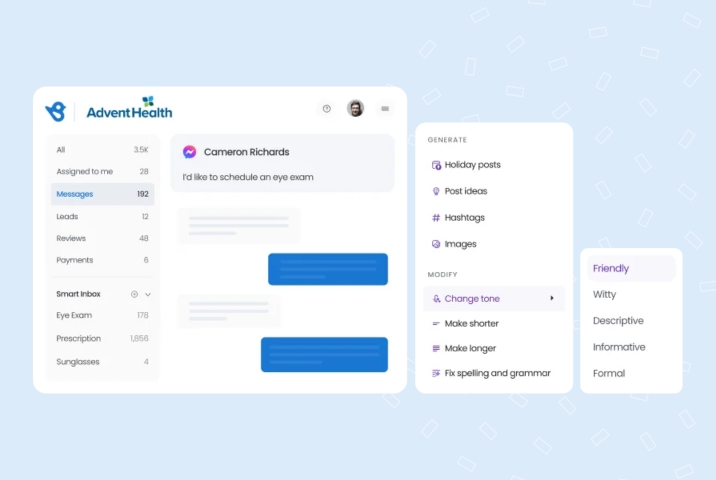
Here’s how AI makes a measurable difference:
- Faster response times: AI agents instantly address routine inquiries, reducing wait times across time zones—from the morning rush in New York to closing hours in San Diego.
- Tailored, personalized support: By tapping into previous customer interactions and business knowledge base, AI delivers replies aligned to each customer’s preferences and needs, boosting customer satisfaction.
- Brand-aligned communication at every location: Whether replying via chat, email, or SMS, AI maintains your brand voice consistently, so every branch sounds like one brand.
- Always-on availability: AI provides instant support 24/7, ensuring no customer queries go unanswered—day or night, coast to coast.
- Unified communication across channels: From web chat to DMs to text, AI ensures seamless, consistent communication, giving customers a smooth experience on every platform.
- Automation of repetitive tasks: AI handles routine tasks like appointment reminders or password resets, allowing your support teams to focus on complex issues.
- Smarter service through data insights: AI continuously analyzes customer data, flags churn signals, and helps you anticipate customer needs before they escalate.
- Custom performance dashboards: Use real-time visibility into support volume, resolution rates, and satisfaction scores—by location, team, or channel—to fine-tune your customer service strategies.
“Birdeye is an efficient, comprehensive solution for businesses seeking to streamline their online customer engagement. Their versatile chatbot seamlessly blends into any website, facilitating smooth user interactions. The intuitive dashboard presents a clear, central hub for tracking all customer correspondence, making Birdeye an effective choice for businesses keen on advancing their digital customer service front. We have seen great benefit from using Birdeye.”
Lisa Sharp, Rising Sun Developing
Implementing AI in customer service: Examples and use cases
Deploying AI in customer support doesn’t mean replacing your team; it means enabling them to work smarter. Here are real-world AI in customer service examples that illustrate how AI agents and tools improve speed, consistency, and customer satisfaction across locations.
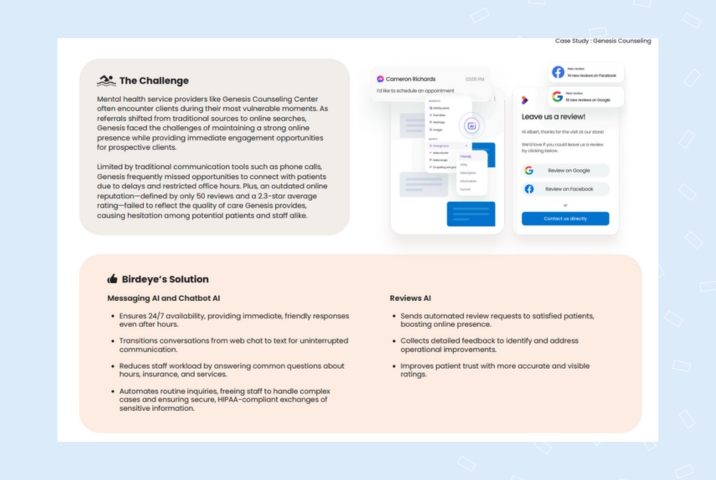
Before diving into each use case, let’s understand how implementing AI can enhance customer interactions. With AI solutions, your enterprise can:
- Reduce dependency on human agents for FAQs and repetitive tasks
- Improve ticket management through smarter routing and triage
- Gain a deeper understanding of customer sentiment
- Protect your business from spam, fraud, and compliance risks
- Scale support without sacrificing personalized interactions
FAQs powered by your knowledge base
AI chatbots integrated with your business’s help center use natural language processing to instantly answer repetitive customer questions, freeing support teams to focus on complex customer issues.
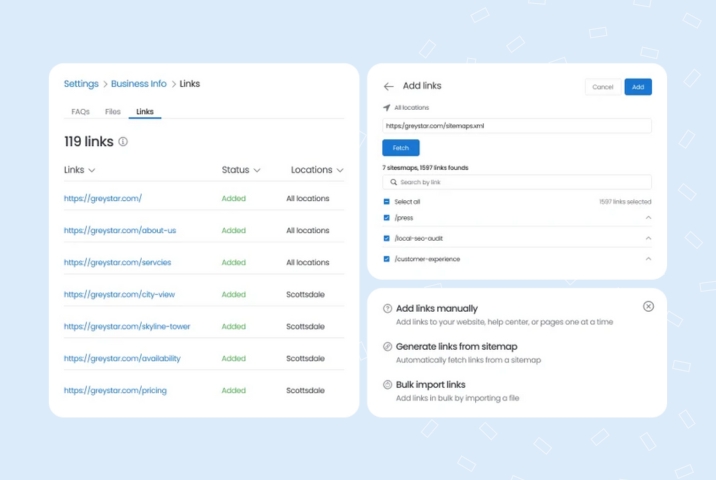
Feedback collection and management
AI streamlines customer feedback collection after purchase or service interactions. It analyzes responses, detects themes, and uses sentiment analysis to help enterprises improve service quality and customer loyalty.
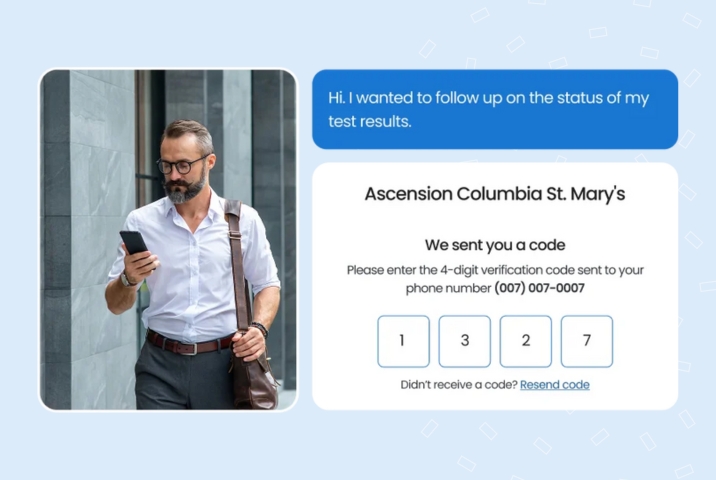
Ticket routing and management
Using AI technology, tickets are auto-assigned to the right team based on inquiry type, urgency, or location, boosting customer service efficiency and reducing resolution time across contact centers.
This helps businesses efficiently address customer concerns and enables support operations to keep the client informed of any steps taken.
AI responses to customer interactions
From chat to email, AI-powered bots generate instant replies that reflect your brand voice. These bots handle thousands of customer queries at once while escalating complex customer requests to human agents when needed.
“Our AI usage for customer experience mainly starts with Birdeye. Helping our teams with review responses has been a huge time-saver for our managers and administrators.”
Craig McVey, COO, Mountainside Dental
AI-powered summaries and sentiment analysis
AI tools automatically summarize long customer conversations and flag emotional cues using advanced natural language processing. This gives support agents context to resolve problems faster and with more empathy.
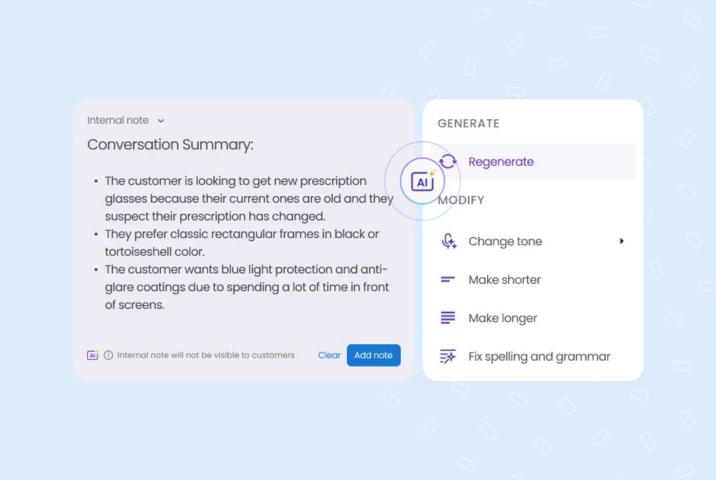
Transform customer service operations with purpose-built AI solutions
Want to see the impact of Birdeye on your business? Watch the Free Demo Now.
Spam and fraud detection
AI helps safeguard customer interactions by identifying suspicious patterns, phishing attempts, or abusive messages. This ensures legitimate customer needs aren’t buried under noise or risk.
Even though implementing AI in customer service operations can be a huge boost to the productivity and efficiency of your business, it does have its challenges. It is important for enterprises to balance the advantages of AI within the ethical implementation norms so as to protect the privacy of their customers.
Let us understand what the ethical implementation of AI tools in customer service functions looks like.
Ethical use of AI in customer service: 4 must-follow principles
Responsible use of customer service AI is key to earning customer trust, protecting data, and preserving human connection across all your locations. Here’s how to implement it ethically:
- Balance automation with empathy: Let AI agents handle routine tasks, but keep human agents available for emotional or complex issues that demand real understanding.
- Keep the human touch alive: Always offer the option to talk to a person. Some customer expectations still require empathy and a real voice, especially when rebuilding customer relationships.
- Prioritize data privacy and transparency: Ensure your AI complies with relevant industry regulations and handles customer information securely, particularly in sectors such as banking or healthcare.
- Review, measure, and improve: Use sentiment analysis and customer feedback to evaluate performance and evolve your customer service strategies—never treat AI as a “set-it-and-forget-it” tool.
Conclusion
For multi-location businesses, delivering consistent, timely, and high-quality support isn’t easy, but AI in customer service makes it possible. From reducing response times to uncovering customer insights, AI empowers your team to scale with precision, empathy, and speed. When implemented ethically and strategically, it doesn’t just improve operations, it elevates the entire customer experience.
FAQs on AI in customer service
AI enhances customer service operations by automating repetitive tasks, reducing wait times, and routing tickets to the right agents. It also helps analyze customer sentiment and customer behavior to optimize processes and elevate the customer experience.
Generative AI in customer service drafts human-like replies, summarizes long messages and delivers brand-aligned responses instantly. It ensures personalized interactions while reducing strain on support staff across locations.
Common AI in customer service examples include chatbots answering FAQs, AI-powered routing of support tickets, automatic sentiment detection in reviews, and AI-suggested replies to customer inquiries. Tools like Birdeye’s Brand AI and Inbox AI Assist bring these capabilities to multi-location businesses.
Birdeye solutions: Purpose-built AI solutions for your customer service needs
Generic AI tools fall short when it comes to the complexity and scale of location-based businesses. That’s why Birdeye, the #1 AI platform for local brands, has developed purpose-built AI tailored to your industry, brand voice, and operational structure. These tools don’t just automate—they transform customer service into a growth driver.
Here’s how Birdeye’s AI suite improves customer interactions, boosts operational efficiency, and enables exceptional service at every location for enterprises.
- Brand AI: Trained on your brand’s tone, policies, and preferences, Brand AI crafts personalized support responses that sound like you across reviews, chats, messages, and emails. It ensures your customer service team delivers consistent, on-brand replies at scale.
- Industry AI: Grounded in years of vertical-specific insights, Industry AI understands your customer base, regional challenges, and compliance needs. It helps support teams stay sharp and respond intelligently to industry-specific customer inquiries.
- Inbox with AI Assist: Centralize all customer conversations into one platform—email, webchat, social DMs, text, and let AI Assist generate replies, prioritize urgent messages, and summarize long threads. This increases agent productivity while ensuring timely support.
- Reviews AI: Respond to reviews faster with AI-suggested replies tailored to the customer’s tone and feedback. With built-in sentiment analysis, your team can quickly spot risks, resolve concerns, and turn feedback into an improved customer experience.
- Insights AI: Surface hidden patterns in customer behavior, uncover gaps in service quality, and get recommendations to improve customer satisfaction—all via easy-to-use dashboards powered by AI.
Birdeye’s ecosystem of AI-powered solutions ensures that your brand delivers great customer service across every channel, branch, and customer touchpoint. Watch a free demo to learn more.

Originally published









